This report describes the key events that significantly impacted Russia’s political, economic and social processes.
Based on the results of the past week, the following trends can be summarised:
- Against the background of Turkish President Recep Erdogan’s visit to Russia and negotiations with Vladimir Putin, the issue of relations between the two states has become significantly more urgent. In this context, it needs to be noted that the meeting between Putin and Erdogan is a meeting of two actors who are playing a play about the two countries’ friendship. At the same time, the audience is wonderfully aware that the game is quite fake. There are many contradictions in relations between Turkiye and Russia (Syria, the Caucasus, Crimea). But at the same time, many points force forced cooperation. Both Moscow and Ankara understand this necessity. And they know that this alliance will break sooner or later.
- The active participation of Sergei Lavrov in various summits and official events in Asia and the Middle East is a public demonstration by Russia of the implementation of its pivot towards Asia. Sergei Lavrov’s latest statements about strengthening the states of Asia and the Middle East in the geopolitical arena, as well as regular nods to the Global South, prove that Russia continues to look for reliable partners in a new, more aggressive environment.
- It is worth recognising that the Delhi G20 summit was a real diplomatic defeat for the Global West. The West has demonstrated that it can no longer dictate its position in the context of the crystallisation of the Global South. And the Ukrainian issue has become decisive within the framework of the current summit. It can be predicted that in the future, the interests of the West will increasingly be confined exclusively within the framework of the G7, and the G20 will become an area for discussions between two parts of a divided planet; the unified position of the G20 can be forgotten for an indefinitely long time.
This digest examines the following issues that were most relevant for Russia during 04th – 10th of September:
1. Russian-Turkish negotiations in Sochi;
2. Telephone conversation between Vladimir Putin and the Crown Prince of Saudi Arabia, Mohammed bin Salman Al Saud;
3. Video statement from Vladimir Putin on the occasion of the 80th anniversary of the liberation of Donbas;
4. Sergei Lavrov’s visit to Jakarta and participation in the East Asian Summit;
5. Participation of Sergei Lavrov in the G20 summit in New Delhi;
6. Meeting of Vladimir Putin with young nuclear scientists.
This Content Is Only For Subscribers
- Russian-Turkish negotiations in Sochi
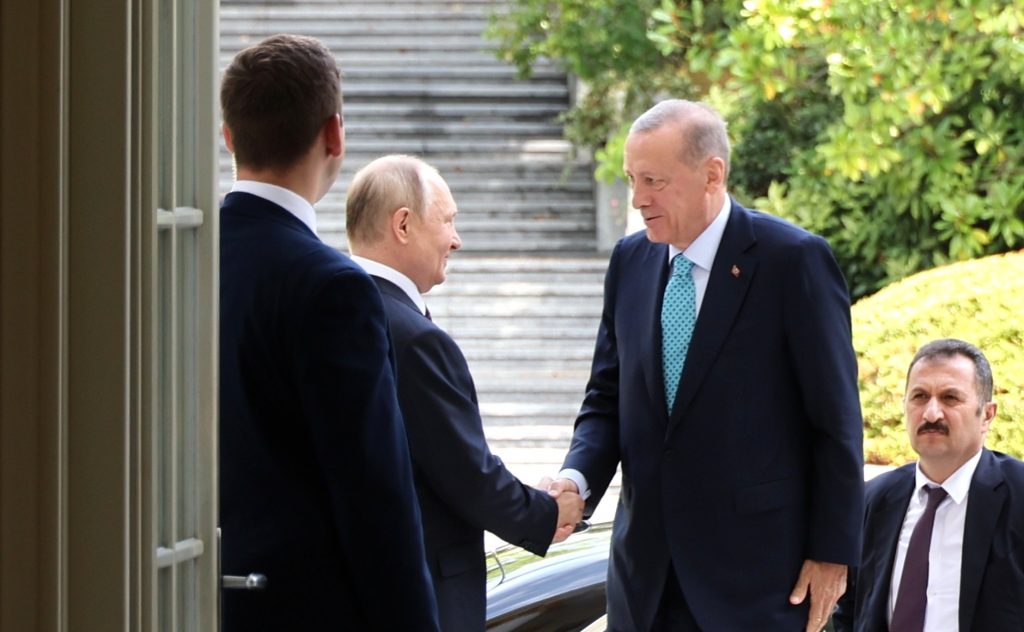
On Monday, September 4, Turkish President Recep Erdogan arrived on a working visit to Sochi to meet with Vladimir Putin. The main topic of the meeting was the issue of resuming the export of Russian grain, including within the framework of the Black Sea Grain Initiative (“grain deal”). Also, according to the parties, Erdogan and Putin discussed the previously announced trilateral agreement between Russia, Turkiye and Qatar on grain supply to countries in need. From the final statements of both presidents, it became clear that during the negotiations, the escalation in relations between Armenia and Azerbaijan and several other issues were discussed.
It is important to note that on the Russian side, the meeting was also attended by presidential aides Yuri Ushakov and Maxim Oreshkin, Defense Minister Sergei Shoigu, Putin’s press secretary Dmitry Peskov, and Chairman of the Central Bank Elvira Nabiullina.
Key theses of the statements in the beginning of the meeting:
- Putin: “I would like to draw your attention to the fact that last year our trade turnover increased by more than 80 per cent – by 86, in my opinion. In the first half of this year, the positive trend continues. It’s not as powerful as it was last year, but it’s still positive.”
- Putin: “We have made progress, and I hope we will soon complete negotiations on creating a gas hub in Turkiye to make the energy situation in the region more stable and balanced. I think this will be beneficial.”
- Putin: “We have something to talk about from the point of view of ensuring security in the region. Of course, we will not ignore issues related to the Ukrainian crisis. I know you intend to raise questions about the grain deal. We are open to negotiations on this issue.”
- Putin: “Of course, other countries in the region, I mean the Libyan track. There are many other issues of a bilateral and international nature that will certainly be the focus of our attention today.”
- Erdogan: “Our relations between Turkiye and Russia, especially regarding foreign trade turnover, reaching USD 62 billion. And our task is to achieve 100 billion dollars in foreign trade turnover – this makes us very happy.”
- Erdogan: “On the other hand, one of the important steps between Turkiye and Russia is, of course, the tourism area. Currently, in this area, in tourism, Russian tourists occupy first place among our guests.”
- Erdogan: “We can say that the whole world is looking at the grain deal: what will happen, what will be the result? Everyone has an expectation. I believe that after our contacts and during our press conference, we will give the world the necessary message, especially to underdeveloped African countries – such a step in this regard will be of great importance.”
- Erdogan: “Another important feature is the military-defense industry, the energy sector. There are steps between us, especially concerning natural gas. Of primary importance in this regard for us is that we have good, important relations with Russia in terms of natural gas. I believe that we will develop these relations.”
Key statements of the parties following the meeting:
- Putin: “There is a tendency towards more active use of national currencies – the ruble and the lira – in commercial exchanges. At the same time, the share of the dollar and euro in mutual settlements is consistently decreasing. Our central banks are closely involved in developing a correspondent network between financial and credit organisations of the two countries.”
- Putin: “Rosatom continues to build Turkiye’s first nuclear power plant, Akkuyu.” It will consist of four power units of Russian design with a total capacity of four thousand 800 megawatts. About 25 thousand of our and Turkish nuclear specialists, engineers, and workers are working day and night so that the launch of the first power unit of the station takes place next year, 2024.”
- Putin: “I want to emphasise that Russia has always been and will be a reliable, responsible gas supplier. We intend to continue providing the Turkish economy with this cheap, highly efficient, environmentally friendly fuel. Moreover, we are ready to export gas in transit through Turkiye to consumers in third countries – where our partners are interested in this.”
- Putin: “As I have said more than once, we were simply forced to make this decision – I mean, Russia was forced – since Western countries blocked and continue to block the implementation of the “grain deal” in terms of ensuring access for Russian agricultural products to world markets.”
- Putin: “While Russia clearly provided security guarantees for shipping as part of this deal, the other side used humanitarian corridors for terrorist attacks against Russian civilian and military targets. This cannot be tolerated any longer.”
- Putin: “To put it mildly, the West deceived us about the Black Sea Initiative’s humanitarian goals to assist developing countries. Because of the 32.8 million tons of cargo exported from Ukraine, more than 70 per cent—I want to emphasise this again—more than 70 per cent went to wealthy countries, primarily to the countries of the European Union.”
- Putin: “I would like to reaffirm our principled position: we will be ready to consider the possibility of reviving the “grain deal”, I told Mr. President about this again today, and we will do this immediately – as soon as everything is fixed in it is fully implemented agreements to lift restrictions on the export of Russian agricultural products.”
- Putin: “For its part, Russia, despite all the obstacles being put in place, intends to continue exporting food and fertilisers, helping to stabilise prices and improve the situation in the global agricultural industry. For these purposes, they proposed, in particular, to organise the supply of one million tons of grain from Russia at a preferential price for processing in Turkiye and then free transportation to the poorest countries. In this sense, we also count on the help of the state of Qatar, which, for humanitarian reasons, is ready to support the poorest countries.”
- Putin: “During the negotiations, issues related to the Syrian settlement were also discussed. We greatly appreciate your cooperation with the Republic of Turkiye in this area. In particular, we are constructively interacting within the framework of the Astana format, which is currently the most effective mechanism for international consultations on Syria.”
- Putin: “During the exchange of views on the situation in Libya, the commitment to a comprehensive settlement of the long-term crisis in this country was confirmed based on negotiations and the search for compromises, avoiding outbreaks of violence and preventing the collapse of the Libyan state.”
- Erdogan: “Today we held both a tete-a-tete meeting and an inter-delegation meeting. We assessed the steps that can be taken to further strengthen our multifaceted cooperation, especially in trade, energy, agriculture and tourism.”
- Erdogan: “Black Sea Initiative: we are glad that Russia is opening an office in the Turkish Republic of Northern Cyprus. I believe Russia, especially the “Black Sea Initiative,” played a key role in the poorest countries. This initiative has been like a breather for the poorest countries.”
- Erdogan: “We are making every effort to establish lasting peace and stability in our region. In my speeches, I note that there is no winner in the war or loser in the world. We adhere to this principled approach. Previously, we held direct negotiations between the parties. As always, we stand ready to do our part.”
- Putin: “Now regarding the resumption of the “grain deal”. I have already said this; I can hardly add anything here. We initially agreed to participate in it, including because we agreed – again through the mediation of the President of Turkiye, the United Nations – we agreed on fulfilling several obligations in the interests of the Russian side.”
- Putin: “We are not against this deal; we are ready to immediately return to it as soon as the promises given to us are fulfilled. That’s all. Today, they will fulfil their promises – within the next few days, we will return in full and achieve everything they want from us.
- Erdogan: “The Black Sea Corridor will serve the poorest countries that receive grain. But 44 per cent of this grain, if it goes to European countries, it is fair; Russia says correctly: 14 per cent was sent to Turkiye, and about six per cent, in this region, was supplied to African countries. But, one way or another, we want to send to the poorest African countries together with Russia.”
- Putin: “We do not consider joint work with Turkiye and, possibly, Qatar to supply one million tons of grain as an alternative to the Black Sea grain deal.” There is also Ukraine, which has its interests. We understand this very well and are aware of this. So it’s not a replacement, but it’s certainly a huge contribution on our part.”
- Putin: “As for the stalling of the counter-offensive, it’s not a stalling; it’s a failure. At least that’s how it looks today. Let’s see what happens next. I hope that this will continue to be the case.”
Upon returning to Turkiye, during a press conference, Erdogan said that during the meeting with Putin, the issue of “Armenia’s provocative behaviour in the Caucasus” was also discussed.
The “grain deal” issue:
At the same time, after the meeting between Putin and Erdogan in Sochi, conversations about the possibility and conditions for resuming the grain deal intensified. The chronology of events last week demonstrated that this is also the case. There is no consensus in the West:
- Even on the eve of the meeting between the presidents of Russia and Turkiye, the Turkish news agency Anadolu stated that the UN was preparing a new package of proposals for the “grain deal,” which supposedly involves reconnecting Rosselkhozbank to SWIFT and unfreezing the assets of Russian companies.
- Following the negotiations in Sochi, Putin said that the Russian Federation is ready to restart the grain deal, but only when its conditions on lifting sanctions on exporting Russian agricultural products are met. Until then, the Russian Federation intends to export its food and fertilisers independently.
- Following the Russian president, Recep Tayyip Erdogan said that a new package of proposals could contribute to resuming the “grain deal”. He also stated that alternative grain supply options did not meet safety standards.
- Erdogan also said that Ukraine needs to soften its position to resume the “grain deal”: “To be able to take common steps with Russia, Ukraine needs to soften its approach. Especially now, grain that will be sent to the least developed and poor African countries is important.”
- Ukrainian Foreign Minister Dmitry Kuleba said that Ukraine will not make concessions on the issue of resuming the “grain deal”, which Recep Erdogan said.
- On Tuesday, September 5, Erdogan announced some details from the UN proposals to the Russian Federation to restart the grain deal. According to him, the UN Secretary-General proposed a mediation mechanism for the Russian Federation to participate in the grain deal without direct connection to SWIFT. The organisation is also working to eliminate obstacles in the insurance of Russian ships that arose due to Western sanctions.
- On Wednesday, September 6, the Russian Foreign Ministry announced that Russia and Turkiye had agreed on the supply of one million tons of grain, and the development of technical details would begin shortly. The statement also says that the development of technical details on the grain supply to Turkiye will begin soon with the assistance of Qatar.
- On Thursday, September 7, the CEO of the world’s largest insurer, Lloyd’s, John Neil, said that his company would not insure grain supplies from Ukrainian ports without a new corridor under the auspices of the UN.
- On Friday, September 8, the German publication Bild published a letter from UN Secretary-General Antonio Guterres, sent to the Russian Foreign Minister on August 28, indicating that the UN is ready to fulfil all Russia’s conditions for resuming the grain deal. This letter contains the following proposals:
- The EU will lift sanctions against Rosselkhozbank, which was disconnected from SWIFT;
- Russian cargo ships will be insured against Ukrainian attacks in the Black and Azov Seas with the participation of the large insurance company Lloyd’s;
- The UN Secretary-General will facilitate the partial return of frozen assets of Russian fertiliser producers;
- Russian ships transporting food and fertilisers will again be allowed to dock in EU ports. To this end, UN representatives have already negotiated with the European Commission and the authorities of Germany, Belgium, Spain and the Netherlands.
- Speaker of the Ukrainian Foreign Ministry Oleg Nikolenko, in response to a letter from the UN Secretary-General to the head of the Russian Foreign Ministry, stated that Ukraine is against weakening part of the sanctions regime against the Russian Federation in exchange for the renewal of the grain agreement.
- At the same time, Antonique Guterres’ deputy representative, Farhan Haq, said that the UN is not trying to achieve the lifting or circumvention of anti-Russian restrictive measures. Proposals for a grain deal are drawn up, considering existing sanctions regimes.
- On Saturday, September 9, during a speech at the G20 summit, Turkish President Recep Tayyip Erdogan called for agreeing to Russia’s demands to resume the “grain deal.”
- Commenting on the initiatives of Antonio Guterres and Recep Tayyip Erdogan to lift some of the sanctions on Russia, the head of the Office of the President of Ukraine, Andriy Yermak, said that he also does not support this option: “Force works, not compromises.”
- In turn, Putin’s press secretary Dmitry Peskov said that the proposed options for resuming the “grain deal” do not suit Russia; “Moscow demands the implementation of previously reached agreements.”
Outcomes and outlook:
The meeting between Putin and Erdogan is a meeting of two actors who are playing a play about the two countries’ friendship. At the same time, the audience is wonderfully aware that the game is entirely fake. There are many contradictions in relations between Turkiye and Russia (Syria, the Caucasus, Crimea). But at the same time, several points force forced cooperation. Both Moscow and Ankara understand this necessity. And they understand that this alliance will crack sooner or later. But if Putin spoke with an eye to the relationship’s strategic nature, Erdogan avoided strategy questions in every possible way and focused primarily on tactical tasks. One of these areas is an alternative to the “grain deal”.
Russia is offering Turkiye some kind of alternative to the Chicago Grain Exchange in every possible way. However, official Ankara is trying to avoid long-term projects and promises. That is why the decision to export 1 million tons of Russian grain is only a bar that will help Erdogan compensate for losses from the cessation of Ukrainian exports as part of the “grain deal.” In essence, this is a political and economic bribe to Erdogan. Another thing is that this bribe will help Russia further develop its influence in Africa and Asia.
One also gets the impression that in a big political game, Putin is ready to sacrifice Armenia to allied relations with Turkiye (which, from Putin’s point of view, is not so bad – a new war in the Caucasus could hit the prestige of American diplomacy, which for a month and a half has been proud of that finally, with its help, the long-term Armenian-Azerbaijani conflict has been resolved, and on the eve of the presidential elections in the United States, this also means a confrontation with the influential Armenian lobby in America).
- Telephone conversation between Vladimir Putin and the Crown Prince of Saudi Arabia, Mohammed bin Salman Al Saud
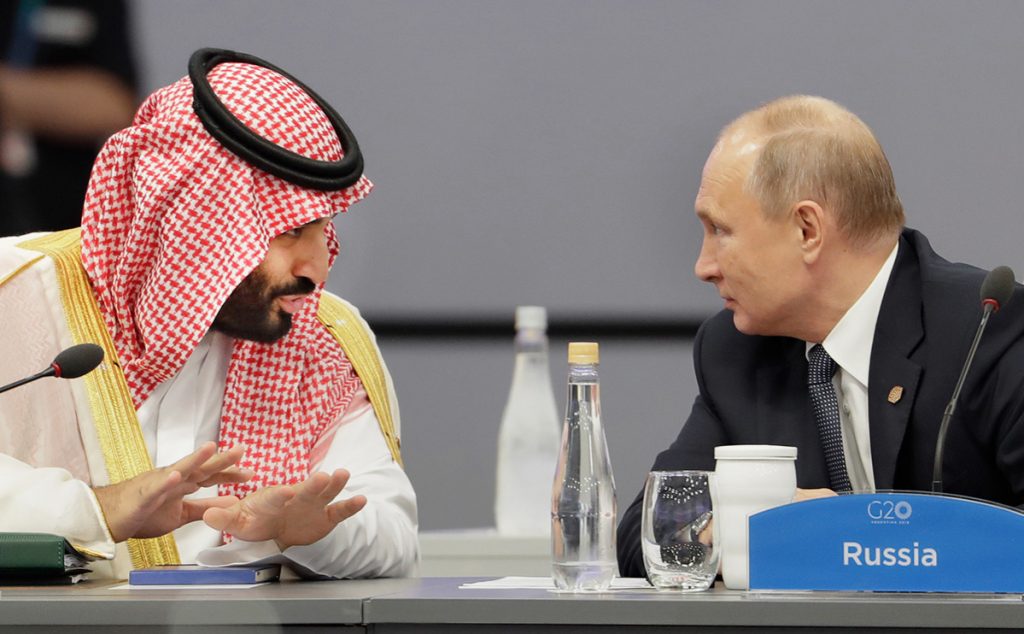
On Wednesday, September 6, Vladimir Putin spoke with the Crown Prince of Saudi Arabia, Mohammed bin Salman Al Saud. It is noted that the conversation was organised at the initiative of the Saudi side. During the conversation itself, the Crown Prince expressed gratitude to the Russian side for the consistent support of Saudi Arabia’s request to join the BRICS, and the Russian President, in turn, congratulated the Saudi leadership on the decision taken at the Unification summit in Johannesburg on this matter and informed about the priorities of the Russian chairmanship in BRICS in 2024. Further interaction between the two countries in the OPEC+ format was also discussed.
No other details of the conversation were reported. However, on Saturday, September 9, Mohammed bin Salman Al Saud spoke with Ukrainian President Volodymyr Zelensky on Skype. Both events have several common points.
Outcomes and outlook:
The phone call between Putin and Prince Mohammed is a symbolic gesture that was supposed to show the world that today, there are very close relations between Moscow and Riyadh, which will allow in the foreseeable future to talk not only about a joint geopolitical game (Saudi Arabia decided to join BRICS) but also about threats to US energy stability: Russia and Saudi Arabia can play to increase oil prices globally, which will lead to a severe blow to the US economy, which is highly dependent on world oil prices.
Over the past five years, Saudi Arabia and Russia have been drawing closer together and demonstrating a tendency to develop a common set of actions directed against a unipolar world: last year’s visits by Biden and the leaders of European states to Riyadh did not produce any results. Mohammed bin Salman does not seem to forgive insults – even if they come from the lips of the leaders of the Western world.
- Video statement from Vladimir Putin on the occasion of the 80th anniversary of the liberation of Donbas
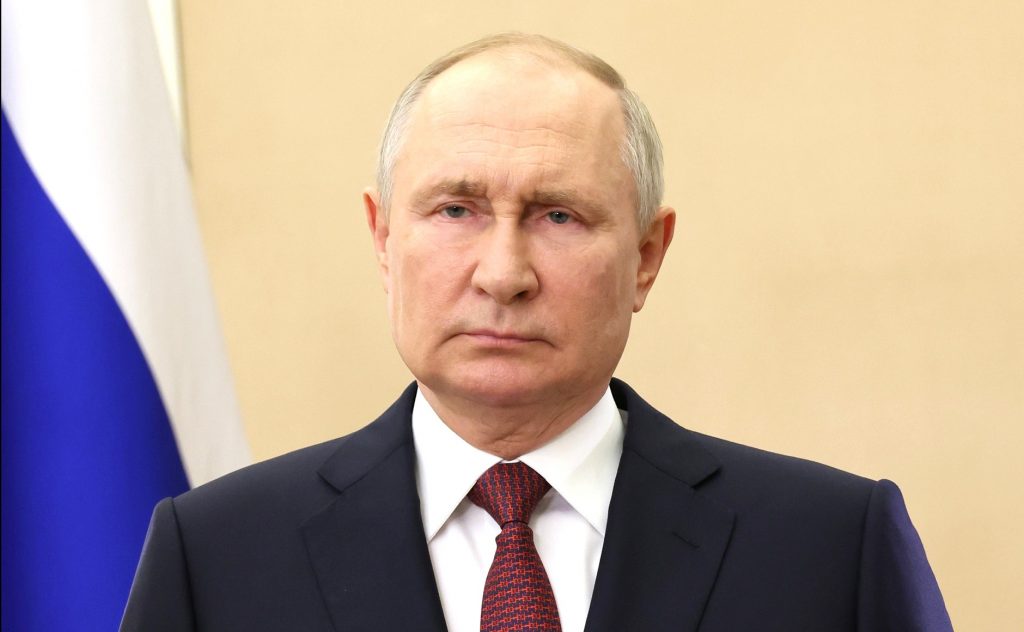
On Friday, September 8, Vladimir Putin made a video message in honour of the 80th anniversary of the liberation of Donbas from Nazi troops. In his speech, the Russian president, in his usual manner, made a brief historical excursion into the events of 1943 and also spoke about the exploits of the Soviet army.
Key statements:
- “On this day 80 years ago, the legendary unconquered Donbas, a centuries-old stronghold of Russia, a land of workers, warriors, a rich and generous land, was liberated and cleared of Nazi occupiers.”
- “His resources were of enormous importance to the enemy. Taking possession of them was one of the goals of Germany’s attack on the Soviet Union. The Nazis did everything to retain the Donetsk steppes and force people to work for the war machine of the Third Reich.”
- “The banks of the Seversky Donets are dotted with pillboxes and bunkers and many kilometres of minefields. It didn’t seem easy to break such a line of defence. Still, the soldiers of the Red Army completed this task, performed feats beyond human capabilities, and went through a heroic and sacrificial path, consolidating the triumph of the Soviet troops on the Kursk Bulge.”
- “The Saur-Mogila memorial, destroyed during the battles of 2014, has now been completely restored, and next to the images of Soviet soldiers, the exploits of their valiant, glorious descendants – the new heroes of Donbas – are rightfully immortalised.”
Outcomes and outlook:
For Putin, an appeal to the legacy of the Second World War (and its constituent part, the Great Patriotic War) is an important element of modern Russian ideology, which has recently acquired a completely different meaning: in Russia, they strongly emphasise that the current European Union, in its outlines, is a territory conquest of the Third Reich and its satellites. And that the current confrontation with the West is a new confrontation with the new Third Reich, which is supported by the former allies of the USSR in the anti-Hitler coalition – the USA and Great Britain.
Hence the often-drawn parallels between the current war against Ukraine and the events of 1941–1945. Addressing the residents of Donbas, Putin:
- Once again, emphasised that he considers Donbas as the territory of the Russian Federation.
- Sends signals about the inadmissibility of revising history.
- Once again, it focuses attention on important (from the point of view of the Russian propaganda system) ideological guidelines.
In general, despite the attempt to reform both the foreign policy and domestic political systems deeply, the Kremlin continues to rely on the previous principles of influencing the masses, which have recently demonstrated less and less effectiveness.
- Sergei Lavrov’s visit to Jakarta and participation in the East Asian Summit
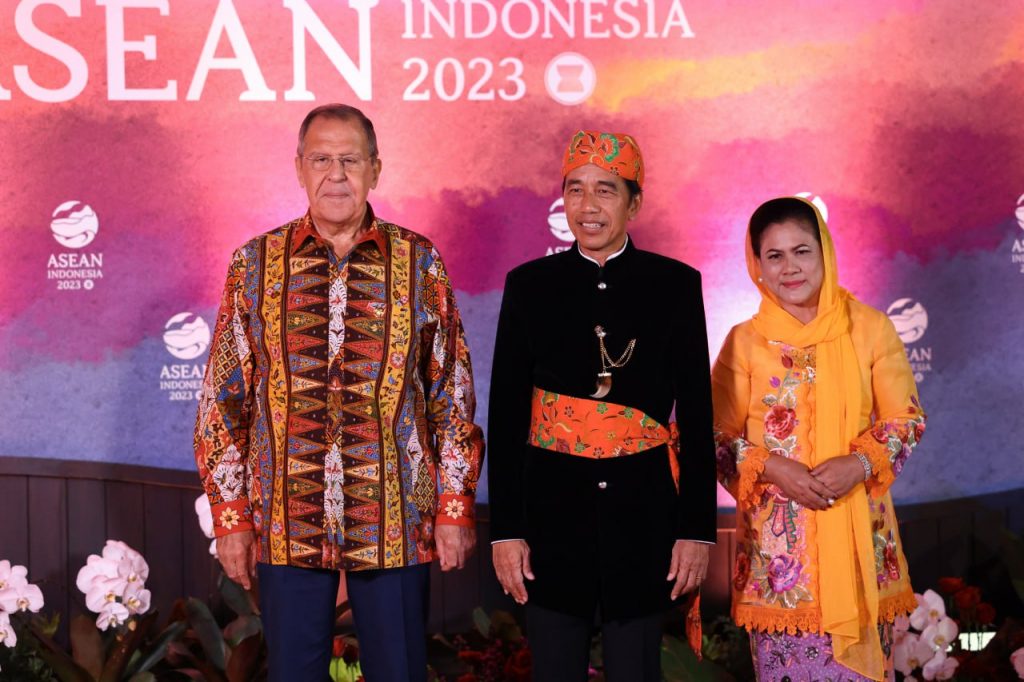
On Thursday, September 7, Russian Foreign Minister Sergei Lavrov visited Jakarta, where he participated in the XVIIIth East Asia Summit. According to official information, during public discussions and debates, Lavrov expressed Russia’s position in support of strengthening the architecture of equal and indivisible security in the region and noted the importance of maintaining cooperation in the ASEN coordinate system. Lavrov also spoke about the risks of militarisation of East Asia due to the intensification of NATO forces and infrastructure in the region.
It is important to note that on the eve of his visit to Indonesia, Sergei Lavrov visited Bangladesh, where he met with the country’s Minister of Foreign Affairs. After Dhaka and Jakarta, Lavrov headed to India to attend the G20 summit.
Outcomes and outlook:
Sergei Lavrov has recently been authorised to attend important international forums, which Vladimir Putin cannot attend (due to an international court issuing an arrest warrant). From Russia’s point of view, the forum in Jakarta was not strategically important, but what is important is that Russia at such forums demonstratively supports China’s policy in the Pacific region and the East Asian region. That is why participation in the East Asian Forum was important for Russia – primarily in supporting its allies – China and Vietnam.
At the same time, Russia is trying to demonstrate the implementation of its turn towards Asia publicly. Sergei Lavrov’s latest statements about strengthening the states of Asia and the Middle East in the geopolitical arena, as well as regular nods to the Global South, prove that Russia continues to look for reliable partners in a new, more aggressive environment.
- Participation of Sergei Lavrov in the G20 summit in New Delhi
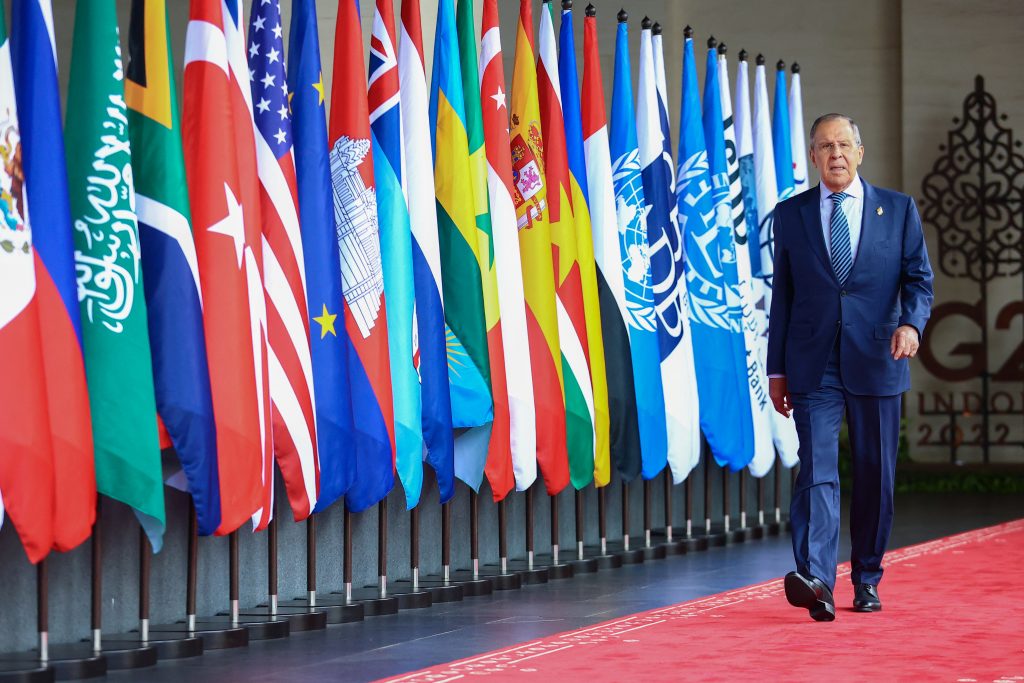
On Saturday, September 9, the opening of the G20 summit took place in New Delhi (India). Earlier, it became known that the Russian president refused to participate in the event, and Russian Foreign Minister Sergei Lavrov went to India instead.
At the same time, on September 8, an official statement appeared on the website of the Russian Foreign Ministry, which noted that the G7 countries are putting pressure on India, wanting to reflect unilateral approaches on the situation around Ukraine in the final documents of the G20 summit. The statement also states that despite such pressure, India is trying to preserve neutrality. In particular, New Delhi did not agree to invite Ukraine to the summit at the request of the West.
Following the results of the G20 summit, Sergei Lavrov announced its positive results. He noted that the G20 is currently going through a process of internal reforms. He added that he considers the summit to be a turning point. Lavrov also said that “the West failed to “Ukrainize” the event’s agenda. Largely thanks to such a consolidated position of the Global South in defence of its legitimate interests, it was possible to prevent the success of the West’s attempt to again Ukrainize the entire agenda to the detriment of discussing the urgent problems of developing countries.”
Following the G20 summit in New Delhi, a joint declaration was adopted, which caused a noticeable resonance among world politicians:
- The Group of Twenty, in the final declaration, recognised the difference in views and assessments of the situation in Ukraine among members of the community;
- G20 leaders called on all states to respect the UN Charter and principles of international law, including territorial integrity and sovereignty.
- The G20 countries, in the summit declaration, noted the crucial importance of “peaceful conflict resolution and dialogue.”
- The G20 opposes the use of nuclear weapons or related threats.
- G20 leaders called for full implementation of the grain deal to ensure food and fertiliser supplies from Ukraine and Russia.
Outcomes and outlook:
It is worth recognising that the Delhi G20 summit was a real diplomatic defeat for the Global West. The West has demonstrated that it can no longer dictate its position in the context of the crystallisation of the Global South. And the Ukrainian issue has become decisive within the framework of the current summit.
Even Putin’s absence showed that most G20 participants spoke and voted with an eye on the positions of the Russian president. The presence of Joe Biden at the summit did not change anything.
It can be predicted that later, the interests of the West will increasingly be confined exclusively within the framework of the G7, and the G20 will pivot into a field for discussions between two parts of a divided planet; the unified position of the G20 can be forgotten for an indefinitely long time. Eloquent evidence of this is that Brazilian President Lula da Silva promised to host Vladimir Putin in Brasilia next year – despite the international arrest warrant. On the eve of the US presidential elections, this will be a serious blow to the positions of Joe Biden and his administration.
- Meeting of Vladimir Putin with young nuclear scientists
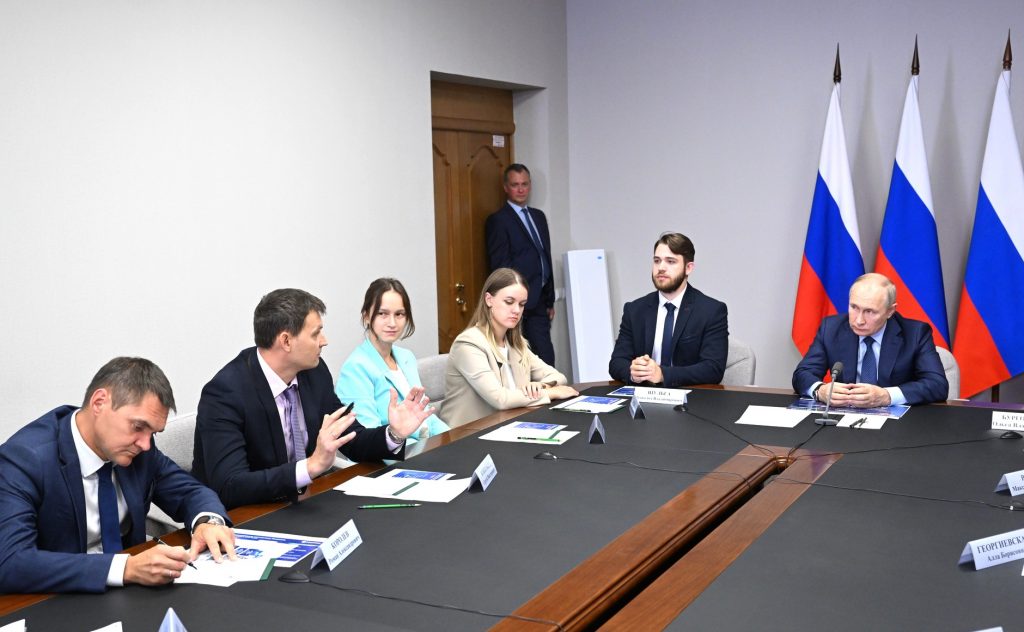
On Friday, September 8, Vladimir Putin visited the Nizhny Novgorod region and the city of Sarov (formerly known as Arzamas-16, one of the leading facilities in Russia for developing and producing nuclear weapons). Vladimir Putin met in Sarov with young scientists and specialists from the Russian Federal Nuclear Center – the All-Russian Research Institute of Experimental Physics (RFNC – VNIIEF).
During the meeting, the Russian President talked to the students and answered several questions regarding plans for the further development of the industry in Russia.
In this context, it is worth noting that in its recent article on nuclear weapons in Belarus, Ascolta published information according to which tactical nuclear weapons come to Belarus from Sarov.
Outcomes and outlook:
Putin’s meeting with young nuclear scientists should be viewed exclusively on two levels. This is another instrumental victory for the Kovalchuks and Kiriyenko: nuclear issues in Russia are within their competence. Secondly, Putin has started his election campaign and is on schedule with team meetings. A speech in front of young scientists who personify the future, technological developments, and, at the same time, the nuclear power of Russia is one of the touches of the future presidential campaign, a brilliant PR move.
At the same time, Putin’s play on this topic should not be viewed as another element of nuclear intimidation. In this situation, the formula according to which the roles of “good” and “bad” police are distributed between Vladimir Putin and Dmitry Medvedev is becoming increasingly noticeable. In this tandem, Medvedev regularly tries to find increasingly intimidating expressions to demonstrate the nuclear threat. In contrast, Putin, at the same time, shows calm and composure. In fact, we are talking about activating the long-familiar thesis: “If not Putin, then people like Medvedev will come to power in Russia – more radical and less reasonable.”


